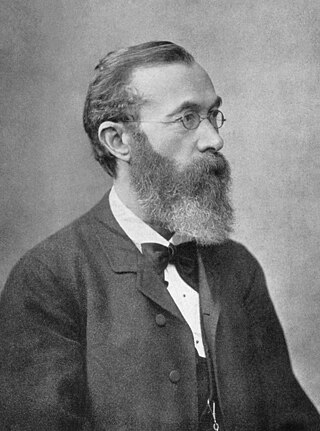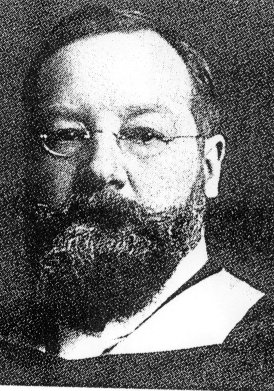
Wilhelm Maximilian Wundt was a German physiologist, philosopher, and professor, known today as one of the fathers of modern psychology. Wundt, who distinguished psychology as a science from philosophy and biology, was the first person ever to call himself a psychologist.

Hermann Ludwig Ferdinand von Helmholtz was a German physicist and physician who made significant contributions in several scientific fields, particularly hydrodynamic stability. The Helmholtz Association, the largest German association of research institutions, is named in his honor.

James Mark Baldwin was an American philosopher and psychologist who was educated at Princeton under the supervision of Scottish philosopher James McCosh and who was one of the founders of the Department of Psychology at Princeton and the University of Toronto. He made important contributions to early psychology, psychiatry, and to the theory of evolution.

James McKeen Cattell was the first professor of psychology in the United States, teaching at the University of Pennsylvania in Philadelphia. He was a long-time editor and publisher of scientific journals and publications, including Science, and served on the board of trustees for Science Service, now known as Society for Science & the Public from 1921 to 1944.
Introspection is the examination of one's own conscious thoughts and feelings. In psychology, the process of introspection relies on the observation of one's mental state, while in a spiritual context it may refer to the examination of one's soul. Introspection is closely related to human self-reflection and self-discovery and is contrasted with external observation.

Edward Bradford Titchener was an English psychologist who studied under Wilhelm Wundt for several years. Titchener is best known for creating his version of psychology that described the structure of the mind: structuralism. After becoming a professor at Cornell University, he created the largest doctoral program at that time in the United States. His first graduate student, Margaret Floy Washburn, became the first woman to be granted a PhD in psychology (1894).
George William Humphrey FRSC was a British psychologist, author, and philosopher. He was the founder of the Canadian Psychological Association, the first Director of the Institute of Experimental Psychology, and Professor of Psychology at the University of Oxford. Humphrey's research concentrated on behavioral studies such as reinforcement, habituation, and apparent movements, as well as psychophysical topics like audiogenic seizures. He is known for Humphrey's Law.
Theoretical psychology is concerned with theoretical and philosophical aspects of psychology. It is an interdisciplinary field with a wide scope of study.
Psychology is defined as "the scientific study of behavior and mental processes". Philosophical interest in the human mind and behavior dates back to the ancient civilizations of Egypt, Persia, Greece, China, and India.
Mathematical psychology is an approach to psychological research that is based on mathematical modeling of perceptual, thought, cognitive and motor processes, and on the establishment of law-like rules that relate quantifiable stimulus characteristics with quantifiable behavior. The mathematical approach is used with the goal of deriving hypotheses that are more exact and thus yield stricter empirical validations. There are five major research areas in mathematical psychology: learning and memory, perception and psychophysics, choice and decision-making, language and thinking, and measurement and scaling.
Oswald Külpe was a German structural psychologist of the late 19th and early 20th century. Külpe, who is lesser known than his German mentor, Wilhelm Wundt, revolutionized experimental psychology at his time. In his obituary, Aloys Fischer wrote that, “undoubtedly Külpe was the second founder of experimental psychology on German soil; for with every change of base he made it a requirement that an experimental laboratory should be provided.”
Kurt Danziger is a German-born academic whose work has focused on the history of psychology, particularly in the 20th century. His innovative contributions to this field have received widespread international recognition.
Jochen Fahrenberg is a German psychologist in the fields of Personality, psychophysiology and philosophy of science.
Functional psychology or functionalism refers to a psychological school of thought that was a direct outgrowth of Darwinian thinking which focuses attention on the utility and purpose of behavior that has been modified over years of human existence. Edward L. Thorndike, best known for his experiments with trial-and-error learning, came to be known as the leader of the loosely defined movement. This movement arose in the U.S. in the late 19th century in direct contrast to Edward Titchener's structuralism, which focused on the contents of consciousness rather than the motives and ideals of human behavior. Functionalism denies the principle of introspection, which tends to investigate the inner workings of human thinking rather than understanding the biological processes of the human consciousness.
Structuralism in psychology is a theory of consciousness developed by Edward Bradford Titchener. This theory was challenged in the 20th century.
David Krech was an American Jewish experimental and social psychologist who lectured predominately at the University of California, Berkeley. Throughout his education and career endeavors, Krech was with many psychologists including Edward Tolman, Karl Lashley, and Rensis Likert.

George Malcolm Stratton was an American psychologist who pioneered the study of perception in vision by wearing special glasses which inverted images up and down and left and right. He studied under one of the founders of modern psychology, Wilhelm Wundt, and started one of the first experimental psychology labs in America, at the University of California, Berkeley. Stratton's studies on binocular vision inspired many later studies on the subject. He was one of the initial members of the philosophy department at Berkeley, and the first chair of its psychology department. He also worked on sociology, focusing on international relations and peace. Stratton presided over the American Psychological Association in 1908, and was a member of the National Academy of Sciences. He wrote a book on experimental psychology and its methods and scope; published articles on the studies at his labs on perception, and on reviews of studies in the field; served on several psychological committees during and after World War I; and served as advisor to doctoral students who would go on to head psychology departments.
Völkerpsychologie is a method of psychology that was founded in the nineteenth century by the famous psychologist, Wilhelm Wundt. However, the term was first coined by post-Hegelian social philosophers Heymann Steinthal and Moritz Lazarus.

The UCL Division of Psychology and Language Sciences is a Division within the Faculty of Brain Sciences of University College London (UCL) and is located in London, United Kingdom. The Division offers teaching and training and undertakes research in psychology and communication and allied clinical and basic science. It is the largest university psychology department in England.

Georgy Ivanovich Chelpanov was a Russian Imperial and Soviet psychologist, philosopher and logician.







